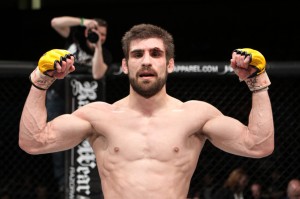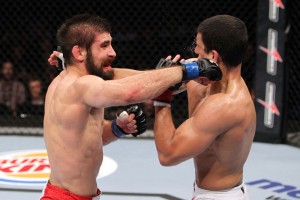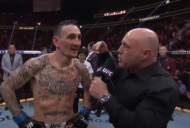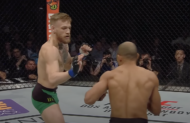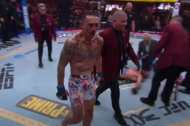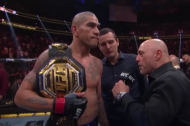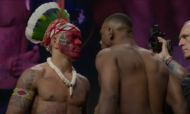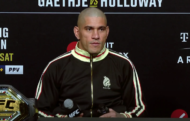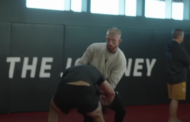Antonio Carvalho To Aspiring Fighters: “I Can Assure Everyone Nothing In This Sport Comes Easy, And You Better Be In It For The Right Reasons.”
By Brent Fryia
Antonio Carvalho’s entrance into MMA was not typical of today’s MMA athletes. He was not a university wrestler who decided to try fighting when his wrestling career was done. He was not a Jiu-Jitsu practitioner or kickboxer who crossed over because of the popularity and opportunities of MMA. He was not a lost soul, a bar-room brawler who found structure and a purpose in MMA.
Carvalho is as far from the stereotypical image of an MMA fighter as can be. He is quiet, humble to a fault, giving of his time and knowledge and a self-confessed video game nerd.
Carvalho’s journey to the UFC is longer than most. It spans several continents and decades. It has been a long journey with dramatic highs and crushing lows.
Born in Canada to Portuguese immigrants, Carvalho soon moved across the Atlantic to his parents’ home in Portugal. There, he suffered at the hands of bullies. Not being able to speak the language made Carvalho an outsider and a target for childhood aggressors.
The soccer field was where he was able to set himself apart and earn some measure of respect from his peers. Rising up through the local ranks as a goal keeper, he earned the attention of some high level scouts.
Carvalho eventually signed a deal with the Sporting Lisbon developmental program, playing in the domestic leagues and being groomed as one of Sporting’s goal keepers of the future. Even when he decided to return to Canada to pursue his education, Sporting kept keep him on their developmental roster, hoping for his return to Portugal and the sport of soccer.
While attending College in Toronto, Carvalho overheard someone talking about prize fighting. Intrigued, he asked about it.
The person he was talking to, Justin Bruckman, would soon become Carvalho’s best friend and training partner. Bruckman would go on to become a decorated fighter, competing against the likes of Georges St. Pierre and earning a win over David “The Crow” Loiseau in the early days of MMA.
Bruckman would eventually open one of the first pure MMA gyms in Canada, a risky venture in the days when MMA was little known, illegal in many regions and considered too barbaric for mainstream television.
Training with Bruckman and a host of Canadian MMA pioneers, Carvalho distinguished himself to the point of earning the attention of Japanese promoters. During these years, the UFC did not have a featherweight division for Antonio to compete in and the WEC was not yet on the radar of most.
The best featherweight fighters in the world were competing in Japan, which is where Carvalho set himself apart from the masses. Victories over Japanese stars such as Rumina Sato, “Lion” Takeshi Inoue and current world #2 ranked Hatsu Hioki vaulted Carvalho up the rankings and into the top 10 fighters in his weight class, with some ranking him as high as No. 5. These victories did not come without a price, though.
As is often the case, the Japanese promoters of the time were not keen on a foreigner defeating some of their homegrown stars. After a while, Carvalho was put on the shelf with few fight opportunities coming in, despite his success.
When fight offers did come in, conditions and terms were unattractive, to say the least. With no money coming in from fighting, Carvalho was barely able to support himself in Japan and had to take odd jobs to feed himself; a tricky task for foreigners to do in Japan.
Eventually, Carvalho was forced to take fights on short notice and while injured. After some time, he decided that he couldn’t continue this way and returned to Canada where he took two full years away from competitive MMA to heal his injuries and assess his MMA options.
Carvalho returned to competitive MMA in 2010 and quickly racked up three quality wins. These wins caught the attention of UFC matchmakers and earned him a spot in the promotion’s featherweight ranks.
After more than a decade of competitive MMA under his belt, Carvalho is finally getting his chance to perform on the biggest MMA stage in the world. He will fight the dangerous George Roop at UFC 149 in Calgary, Alberta.
Brent Fryia: Lots has been made about your transition from soccer to MMA. Where exactly did you play, for whom and at what level? While the two sports seem miles apart, did soccer help you when you decided that you wanted to be a fighter?
Antonio Carvalho: I played throughout my youth in the youth programs of Portugal. I played for my local team where I lived in Portugal. We were often a nationally ranked team. I was a goalkeeper and I was actually called up to a team called Sporting Lisbon, which is one of the top teams in the country. I was brought in to be developed into one of their future keepers. However, I wanted to finish school.
So my parents decided to take myself and my brother back to Canada. I figured I would just go back to Portugal after I finished school and continue pursuing a soccer career. Then I found the martial arts and the rest, as they say, is history.
As far as the sport of soccer helping me in my fighting career, absolutely. I learned early on in my soccer career that hard work and determination do certainly pay off in the grand scheme of things. Not to mention, a lot of my physical attributes crossed over into my martial arts competitions – speed, reflexes and my explosive power. I had a pretty impressive vertical leap too. I could dunk a basketball when I was 15 years old and I’m only 5’8”.
I know a lot of times soccer players get a bad rep as being soft. However, they are some amazingly conditioned athletes. Not to mention, they control a ball with an unnatural part of their body – their feet. I think that is pretty amazing. Actually, Jose Also, the UFC featherweight champion, was originally a soccer player. There are others in the UFC that came from soccer background as well.
BF: Has training changed for you as you’ve gotten older?
AC: Yes it has. I used to train to the point of over training. I think that is actually still prevalent in the sport. It is a very difficult sport to properly manage all the different skill sets and the different types of energy systems needed. Each range from grappling to striking to the up (and) down nature of the sport make MMA, by far, the most difficult sport to train for.
Nowadays, I try to schedule my training properly so that I have energy to put forth all my efforts while on the mats and in the strength and conditioning department. That old saying “Train smarter, not harder” applies a lot more now. However, the biggest change for me now, is the whole concept of rest and rehabilitation.
When I was younger, my body could take so much more punishment and I would be fine to push forward. Nowadays, with a decade of professional fighting, I can’t sustain the kind of training I did in the past. So now I spend just as much time doing athletic therapy and osteopathic treatment as I do training in the gym. If it were not for me doing these things, I may have not been able to compete at the level that I do or even compete for that matter.
BF: You’ve mentioned that making weight is not a problem for you, but that, before your last fight, your usual method got derailed and caused some minor problems. What will you do differently in that regard this time around?
AC: I just have to stick to the plan my nutritionist gives me. When you travel, some unexpected things happen. That said, I am a veteran of this sport and know better and should not let outside forces distract me from the task at hand. I hope to not make the same mistake next time.
BF: The UFC loves to build storylines around their fights. Hatsu Hioki looked very good in his fight against Bart Palaszewski. As one of the only fighters to ever defeat Hioki how would you feel about a rematch if the UFC chose to go with the rematch angle?
AC: I would certainly fight Hioki if the UFC asked me to do so. It would be interesting for me because Hioki has improved leaps and bounds since then. I’m sure from, his standpoint, he would be motivated to get that win back. That said, I would have a lot to prove since I faltered out the gate in my first fight in the UFC. Hioki, at this point, is a title contender. So unless I string together some wins, that fight would likely never happen.
BF: Speaking of Japanese MMA, you’ve had an up and down experience fighting in Japan, with some big victories, but also being borderline exploited by some of the promotions there. Given all of this do you find yourself rooting for Japanese fighters to have success when they come over to fight in the UFC, Bellator and elsewhere?
AC: I don’t so much root for them because they are Japanese. I root for a lot of Japanese fighters because they are my friends. I lived in Japan for two years and have had the chance to meet and train with many of the top Japanese fighters. So, I just want to see my friends succeed.
BF: Jose Aldo is the reigning champ in your division. What is it going to take for someone to knock him out of the top spot? Is it more of a mental issue or a technical issue?
AC: I think it’s both mental and technical. Here is a kid from the “favelas” of Brazil who came from nothing. He used to live out on the street. I have friends who know him tell me that he would often sleep in the gym and would often go days without eating a real meal. So imagine what kind of drive he must have and how mentally tough he is growing up under such conditions and then becoming the success that he is.
I’m pretty sure he will do everything in his power to keep what he now has. Also, from a physical and technical standpoint, he is simply phenomenal. Accurate and fast striking with black belt level Jiu-Jitsu and an amazing base. He is incredibly hard to take down. Even if you were to do so, he is so explosive that he can bounce back to his feet. He is a very deserving champion and deserves all the success he has.
BF: Fighters that are coming up through the ranks now are experiencing a different MMA landscape than you did. There are more opportunities now, more money, more visibility. While the benefits of better pay and more visibility of the sport are obvious do you think there are any drawbacks to coming up in today’s MMA scene compared to the scene you came up in?
AC: I wouldn’t call it a drawback, but I will say that the fighters of today have an easier road then those who started even 10 years ago. Another problem I see is that with the advent of The Ultimate Fighter show and MMA being on regular TV, young people think that there is a lot of money involved in the sport and that they can take an easy road to success.
I can assure everyone, nothing comes easy in this sport and you better be in it for the right reasons. This sport can chew you up and spit you out rather quickly. I will always say this – this is a very honest and honorable sport at its core. You will find out rather quickly what kind of person you are.
BF: Now for fun stuff – Star Wars or Star Trek?
AC: Neither (laughs). Not a fan of (either) series actually. Sorry.
BF: Ninja Turtles or Thunder Cats?
AC: Ninja Turtles. I like Thunder Cats, but always thought that ninjas were just plain cooler. I still have some of the old Ninja Turtles figures kicking around in my garage.
BF: A lion and a shark fight in two feet of water. Who wins?
AC: The lion with his reflexes, quickness and sharp claws and chomping jaws has the edge.
BF: You’re a known coffee junkie… Starbucks, Tim Hortons or other?
AC: I like Tim Hortons, but feel their coffee has gone a little downhill in the last little while. Right now, I enjoy coffee from a place called Coffee Culture. They make a fine cup of coffee.
BF: Favorite 80’s martial arts movie
AC: BloodSport. That was one movie I watched constantly when I was younger. I always hoped that competitions like that would one day exist and not be “underground.” Low and behold, the Gracies came along and created the Ultimate Fighting Championship for the world to watch.
BF: Best 8-bit video game?
AC: Tough one to answer. There are so many classics from the 8-bit era. I would say either Super Mario Brothers 3 or Mike Tyson’s Punch Out! I spent a lot of my youth playing those games. I still manage to occasionally get some play time with both of those ones. Timeless!


